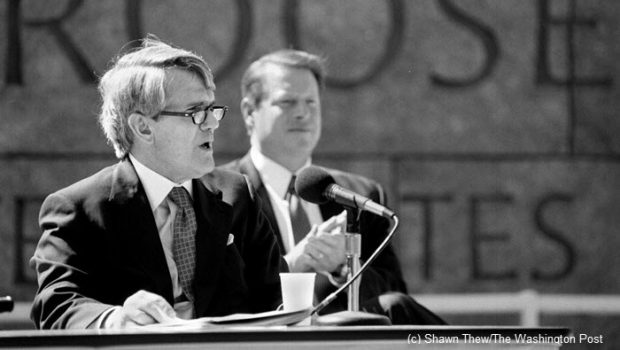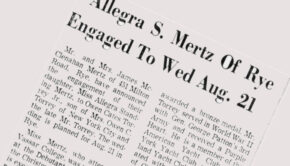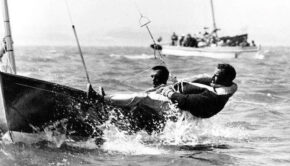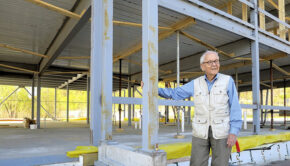Eight Bells: Michael Deland
Published on January 11th, 2019
Michael R. Deland, a hard-charging EPA official who spearheaded the effort to clean up Boston Harbor in the 1980s, died Jan. 8 due to complications from pneumonia at a hospital in Wareham, Mass. He was 77.
A lawyer and ardent champion of the environment, Deland later became a nationally recognized advocate for people with disabilities, such as himself.
He became the New England regional director of the Environmental Protection Agency in 1983, adopting an approach that sometimes seemed at odds with the pro-business policies of the administration of President Ronald Reagan. Deland challenged polluters, local governments and the Army Corps of Engineers as he directed cleanup efforts throughout the Northeast.
Deland blocked an attempt to build a cargo terminal on sensitive wetlands on an island off the Maine coast. He fought the Rhode Island governor and business leaders who wanted to build a reservoir that would have flooded thousands of acres of forests and wetlands.
He overruled the Army Corps of Engineers, which had granted permission to developers to build a mall on 32 acres of wetlands in Massachusetts. When the developers said they would create an artificial wetlands nearby, Deland rejected the idea.
Deland won perhaps his greatest environmental victory in 1988, when the Commonwealth of Massachusetts agreed to pay civil fines of $425,000 and to contribute $2 million to fund various cleanup projects in Boston Harbor.
A competitive sailor for much of his life, Deland was active in the Shields Class, winning the National Championship in 1980 and 1987.
Rumored to be a leading candidate for EPA director after George H.W. Bush was elected president in 1988, Deland was instead nominated to lead the White House Council on Environmental Quality. He was Bush’s top in-house adviser on the environment and coordinated policies among various agencies.
In his first year in the job, Deland warned of the dangers of global warming, noting that “we’ve simply got to ratchet back” the country’s reliance on fossil fuels. On the whole, however, his environmental record in the Bush administration came under attack by onetime allies, who accused him of turning away from ideals he had previously espoused.
When Bush lost the 1992 presidential election to Bill Clinton, Deland became an executive with American Flywheel Systems, a company developing alternative energy sources.
Michael Reeves Deland was born Dec. 13, 1941, in Boston. His father was a prominent lawyer, and his mother supported various environmental and philanthropic efforts.
He graduated from Harvard in 1963, then served two years in the Navy before receiving his law degree from Boston College in 1969. He was an assistant to the president of the University of Massachusetts before joining the EPA’s legal team in 1971. He worked for an environmental consulting firm in Boston from 1976 to 1983.
He was chairman and chief executive of the National Organization on Disability until retiring in 2007, when he moved from Washington to Marion, Mass.
Beginning in the 1960s, Deland had difficulties with walking and mobility. He used crutches at first before switching to a wheelchair in the 1980s, when he was an EPA official.
“To fulfill the demands of that job, I had to be mobile,” he told the Boston College Law School magazine in 1998. “So I accepted being in the wheelchair, but that also meant that I lost strength faster in the muscles of my legs.”
The source of his progressive disability was not diagnosed until the 1980s, when a cyst was found in his spinal cord.
In 1995, Deland was named board chairman of the National Organization on Disability and became a major fundraiser for the advocacy group. He soon learned that a memorial to Roosevelt, then under construction near the Mall, was designed to include three sculptures — but none of the president in a wheelchair.
“It’s a blatant historical distortion,” Deland said in 1996. “For the 49 million Americans who have disabilities, there is no greater role model than FDR. It would be unconscionable if schoolchildren were to go through that memorial and not know that he led the nation from a wheelchair.”
Deland rallied support from several former presidents, leading historians and eight of Roosevelt’s grandchildren. He threatened to lead a protest when the memorial was dedicated in 1997. Finally, a life-size statue showing the four-term president seated in a wheelchair was unveiled in 2001.
Deland was present to observe what he called his “most lasting achievement.”
Survivors include his wife of 45 years, the former Jane Slocum of Marion; a son, Michael Stanton Deland of Malibu, Calif.; twin daughters Melissa Reeves Deland of West Roxbury, Mass., and Holly Louise Deland of Santa Monica, Calif.; a brother; a sister; and three granddaughters.
Source: The Washington Post









 We’ll keep your information safe.
We’ll keep your information safe.